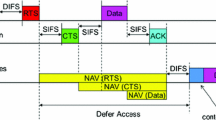Abstract
Existing backoff scheme’s optimization of IEEE 802.11 DCF MAC protocol consider only saturated networks or asymptotic conditions. In real situations, traffic is bursty or streamed at low rates so that stations do not operate usually in saturated regime. In this work, we propose and analyze a backoff enhancement for IEEE 802.11 DCF that requires information only about the network size and that is quasi-optimal under all traffic loads. We first analyze the performance of DCF multiple access scheme under general load conditions in single-hop configuration and we provide an accurate delay statistics model that consider the self-loop probability in every backoff state. We prove then the short-term unfairness of the binary exponential backoff used in IEEE 802.11 by defining channel capture probability as fairness metric. Motivated by the results on fairness, we introduce the constant-window backoff scheme and we compare its performance to IEEE 802.11 DCF with Binary exponential backoff. The quasi-optimality of the proposed scheme is proved analytically and numerical results show that it increases, both the throughput and fairness, of IEEE 802.11 DCF while remaining insensitive to traffic intensity. The analysis is then extended to consider the finite queuing capacity at nodes buffers using results from the delay analysis. NS2 simulations validate the obtained results.
Similar content being viewed by others
References
IEEE. (1999). Wireless LAN medium access control (MAC) and physical layer (PHY) specifications, IEEE 802.11 standards, June 1999.
Bianchi G. (2000). Performance analysis of the IEEE 802.11 distributed coordination function. IEEE Journal on Selected area in Communications 18(3): 535–547
Ziouva E., Antonakopoulos T. (2002). CSMA/CA performance under high traffic conditions: throughput and delay analysis. Computer Communications 25: 313–321
Chatzimisios, P., Boucouvalas, A. C., & Vistas, V. (2003). IEEE 802.11 packet delay-A finite retry limit. In Procd. IEEE GLOBECOM’03.
Carvalho, M. M., & Garcia-Luna-Aceves, J. J. (2003). Delay analysis of IEEE 802.11 in single-hop networks. In Procd. IEEE ICNP’03.
Shabdiz, F. A., & Subramaniam, S. (2003). A finite load analytical model for the IEEE 802.11 distributed coordination function MAC. In Procd. WiOpt’03 workshop. Inria Sophia-Antipolis.
Cantieni G.R., Ni Q., Barakat C., Turletti T. (2005). Performance analyis under finite load and improvement for multirate 802.11. Elsevier Computer Communications Journal 28(10): 1095–1109
Malone, D., Duffy, K., & Leith, D. J. (2005). Modeling the 802.11 distributed coordination function with heterogeneous finite load. Resource Allocation in Wireless Networks, Italy.
Koksal, C. E., Kassab, H., & Balakrishnan, H. (2000). An analysis of short-term fairness in wireless media access protocols. In Procd. ACM Sigmetrics.
Berger-sabbatel, G., Duda, A., Gaudoin, O., & Rousseau, F. (2004). Fairness and its impact on delay in 802.11 networks. In Procd. IEEE GLOBECOM’04, Vol. 5.
Barghavan, V., Demers, A., Shenker, S., & Zhang, L. (1994). MACAW: A media access protocol for wireless LANs. In Procd. ACM SIGCOMM’94.
Kwon, Y., Fang, Y., & Latchman, H. (2003). A novel MAC protocol with fast collision resolution for wireless LANs. In Procd. IEEE INFOCOM’03.
Song, N. O., Kwak, B. J., & Miller, L. E. (2003). Enhancement of IEEE 802.11 distributed coordination function with exponential increase exponential decrease backoff algorithm. In Procd. IEEE VTC Spring’03.
Qiao, D., & Shin, K. G. (2002). Achieving efficient channel utilization and weighted fairness for data communications in IEEE 802.11 WLAN under the DCF. In Procd. International Workshop on Quality of Service.
Bononi L., Conti M., Gregori E. (2004). Runtime optimization of IEEE 802.11 wireless LANs performance. IEEE Transactions on Parallel and Distributed Systems 15: 66–80
Heusse, M., Rousseau, F., Guillier, R., & Duda, A. (2005). Idle sense: An optimal access method for high throughput and fairness in rate diverse wireless LANs. In Procd. ACM SIGCOMM’05.
Chen, Y., Zeng, Q.-A., & Agrawal, D. P. (2003). Analysis and enhancement of IEEE 802.11 MAC protocol. In Procd. ICT’03.
Heusse, M., Rousseau, F., Berger-sabbatel, G., & Duda, A. (2003). Performance anomaly of 802.11b. In Procd. IEEE INFOCOM’03.
Tan, G., & Guttag, J. (2004). Time-based fairness improves performance in multi-rate wireless LANs. In Procd. USENIX’04.
Pong, D., & Moors, T. (2004). Fairness and capacity trade-off in IEEE 802.11 WLANs. In Procd. IEEE ICLCN’04.
Pollin, S. et al. (2005). Delay improvement of IEEE 802.11 distributed coordination function using size-based scheduling. In Procd. IEEE ICC’05.
Anouar, H., & Bonnet, C. (2006). Optimal Constant-Window Backoff Scheme for IEEE 802.11 DCF in finite Load Single-Hop Wireless Networks. In Procd of the 9-th ACM/IEEE International Symposium on Modeling, Analysis and Simulation of Wireless and Mobile Systems, MSWIM.
Jain, R. et al. (1984). A quantitative measure of fairness and discrimination for resource allocation of shared computer systems. DEC technical report TR-301.
Kwak B.-J., Song N.-O., Miller L.E. (2005). Performance analysis of exponential backoff. IEEE Transactions on Networking 13(2): 343–355
Gross, D., & Harris, C. M. (1998). Fundamentals of queuing theory. Wiley.
Author information
Authors and Affiliations
Corresponding author
Additional information
Institut Eurecom’s research is partially supported by its industrial members: BMW Group Research & Technology—BMW Group Company, Bouygues Telecom, Cisco Systems, France Telecom , Hitachi Europe, SFR, Sharp, STMicroelectronics, Swisscom, Thales.
Rights and permissions
About this article
Cite this article
Anouar, H., Bonnet, C. Optimal Constant-Window Backoff Scheme for IEEE 802.11 DCF in Single-Hop Wireless Networks Under Finite Load Conditions. Wireless Pers Commun 43, 1583–1602 (2007). https://doi.org/10.1007/s11277-007-9329-5
Received:
Accepted:
Published:
Issue Date:
DOI: https://doi.org/10.1007/s11277-007-9329-5




